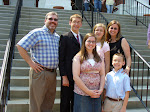
Just before the beginning of Lent, 387, word reached the city of Antioch of a new tax the emperor was exacting on the empire. The citizens of Antioch began to riot, and in the heat of the moment, toppled two statues of the emperor and his wife. This was considered seditious behavior, punishable by whatever the emperor deemed necessary to maintain order and submission (my, how far we have come, politically, eh?)
The city was in shock as the magnitude of the actions began to sink in. Here's how John Chrysostom, pastor of the oldest church in Antioch, began his morning message:
What shall I say, or what shall I speak of? The present season is one for tears, and not for words; for lamentation, not for discourse; for prayer, not for preaching. Such is the magnitude of the deeds daringly done; so incurable is the wound, so deep the blow, even beyond the power of all treatment, and craving assistance from above.
I also like this line:
The Church is not a theatre, that we should listen for amusement.
That's all for today. I'm only 1/3 of the way through the sermon.







